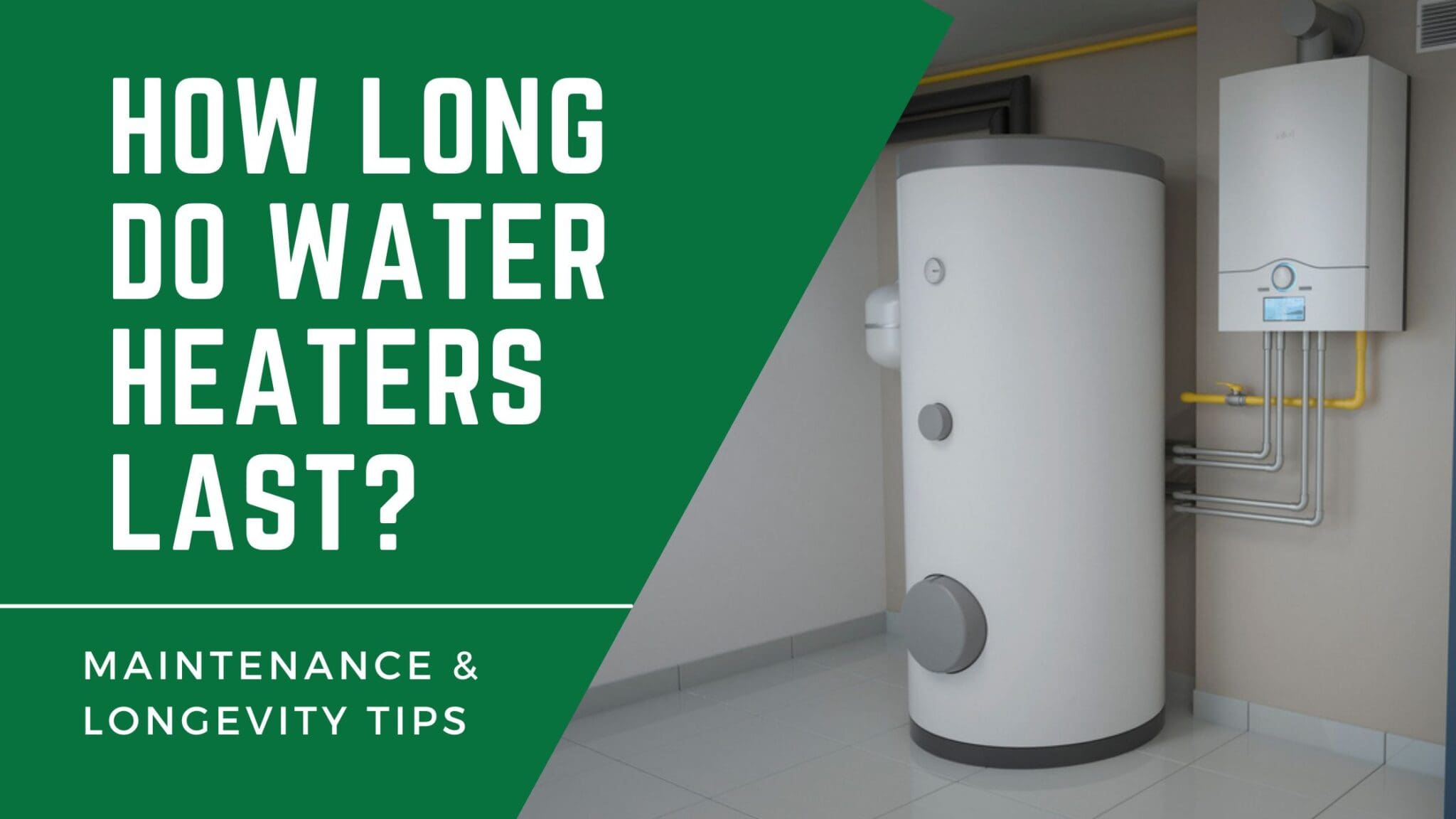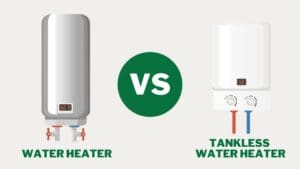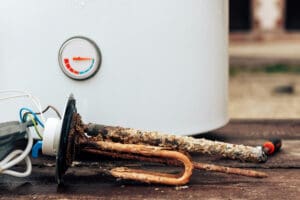
In our daily lives, hot water is not just a luxury. It’s a necessity for comfort and functionality. Yet, have you ever wondered how long do water heaters last? If you have found yourself asking the question, “Why is my water heater not working?” you need a professional plumber’s expertise.
Don’t suffer through cold showers. Find out why your water heater isn’t working and get it fixed by HARP Home Services. With a legacy of excellence in plumbing and heating services, we’re your go-to partner in ensuring your home’s comfort and efficiency. In this article, we dive into water heater life expectancy, helping you understand when it might be time for a replacement.
The Average Lifespan of a Water Heater
Understanding the average life of a water heater is crucial for homeowners. Water heaters fall into two main categories: regular tank-style and tankless heaters.
Tank-Style vs. Tankless Water Heaters

The average lifespan of regular tank-style water heaters is around eight to 12 years. However, various factors can influence this estimate, including the water heater’s quality, maintenance, water hardness, and usage patterns. Well-maintained units may surpass the 12-year mark, while neglect and harsh conditions can lead to earlier replacements.
How long do tankless water heaters last? Tankless water heaters tend to have a longer lifespan. These units can provide hot water for up to 20 years or more. Their longevity is often attributed to the absence of a tank, which eliminates the risk of tank-related failures.
Learn about the benefits of tankless water heater installation offered by HARP Home Services in Connecticut.
New vs. Old Water Heaters
Age plays a significant role in determining the longevity of water heaters. Newer units are less likely to face issues, benefiting from advancements in technology and materials. Conversely, older water heaters may require more frequent maintenance and replacement.
When Is It Time to Replace Your Water Heater?

Ensuring your water heater functions optimally is essential for daily comfort. Recognizing when it’s time for a replacement is equally crucial.
Signs of an Aging Water Heater
- Decline in Heating Efficiency: If your hot water supply is less reliable than it used to be, with lukewarm or cold water becoming the norm, it’s a clear sign of trouble.
- Long Wait for Hot Water: If you are twiddling your thumbs, waiting for hot water to flow from the tap, your water heater might be struggling.
- Fluctuating Water Temperatures: Inconsistent water temperatures, swinging from scalding to freezing, are frustrating and indicative of potential issues.
- Rust and Corrosion: Visible rust or corrosion on the water heater tank is a concerning sign, suggesting deterioration.
- Strange Noises: Unusual clanking, banging, or popping sounds coming from your water heater can signify problems within.
Cost and Benefits Analysis of Replacing Your Water Heater
- When the System Is Too Old and No Longer Efficient: If your water heater is well past its expected lifespan, replacing it with a more efficient model can lead to significant energy savings.
- When Repairs are No Longer Viable: If repair costs pile up and the unit’s reliability remains in question, investing in a new water heater can provide long-term benefits, including consistent hot water and reduced utility bills.
Contact HARP Home Services for reliable water heater replacement services in Connecticut for a hassle-free upgrade.
Factors That Influence Longevity
How long do hot water heaters last? The lifespan of your water heater is not set in stone; it’s influenced by various factors that can make the difference between a heater that lasts and one that fizzles out prematurely.
Water Heater Type and Quality
- Tank Insulation: The level of insulation on the tank matters. A well-insulated tank retains heat better, reducing the workload on the heating element and extending the unit’s lifespan.
- Energy Efficiency: Energy-efficient models tend to have a longer lifespan because they operate with less strain. They’re designed to heat water while minimizing heat loss.
- Make: The manufacturer’s reputation and the materials’ quality can significantly impact a water heater’s lifespan. Investing in a reputable brand often pays off in the long run.
Unsure about the right choice? Explore the pros and cons of electric water heaters vs. gas water heaters. Discuss your options with HARP Home Services.
Proper Water Heater Installation
Proper installation is paramount to a water heater’s longevity. Incorrect installation can lead to inefficiencies, leaks, and other issues that accelerate wear and tear.
Regular Maintenance and Repairs
Like any other appliance, water heaters require regular maintenance to perform their best. Neglecting maintenance tasks like flushing the tank to remove sediment buildup can reduce efficiency and result in a shorter lifespan.
Additionally, timely repairs to address minor issues can prevent them from snowballing into significant problems, necessitating replacement. Schedule a water heater tune-up with HARP Home Services for worry-free performance.
External Factors: Climate and Water Quality
The climate in your region can affect your water heater’s lifespan. It may wear out faster in colder climates, where the heater has to work harder to heat colder water. Similarly, the quality of your water can impact the heater.
Hard water with high mineral content can lead to sediment buildup, reducing efficiency and potentially shortening the heater’s life. Understanding these factors and taking proactive steps can help you maximize your water heater’s lifespan, ensuring you get the most out of this essential home appliance.
Water Heater Maintenance Tips
Proper maintenance is the key to extending the lifespan and efficiency of your water heater.
Here are some essential maintenance tips:
Regular Tank Draining and Flushing
Over time, sediment buildup can occur in the tank, reducing efficiency and potentially causing damage. Regularly draining and flushing the tank helps remove sediment, keeping your heater running smoothly.
Installing a Water Softener
If you live in an area with hard water, installing a water softener can be a game-changer. It prevents mineral buildup in the tank and prolongs the life of your water heater.
Using a Sediment Filter
In addition to draining and flushing, using a sediment filter on your water heater’s inlet can further reduce the amount of sediment that enters the tank, preserving its efficiency.
Using Smart Thermostats
Smart thermostats allow you to control your water heater’s temperature more precisely. You can lower the temperature when you don’t need hot water, saving energy and reducing wear on the unit.
Get Regular Inspection and Tune-Ups
Professional inspections and tune-ups by licensed plumbers or technicians can catch minor issues before they become significant problems. They can also ensure your water heater operates at peak efficiency.
Following these maintenance tips not only extends the life of your water heater but also helps you save on energy bills and ensures you have a reliable hot water supply when needed. Regular care and attention to your water heater can significantly improve its performance and longevity.
The Takeaway
Understanding the lifespan of your water heater and when it’s time for a replacement is important for securing uninterrupted hot water and cost-efficiency. Regular maintenance, proper installation, and water quality are pivotal in determining how long your water heater will last.
For residents in Connecticut seeking expert guidance on water heater replacement and installation, HARP Home Services stands as a trusted partner. Our licensed plumbers in Connecticut ensure efficient installations and replacements, backed by a commitment to on-time service. Discover the best water heater temperature and more when you contact HARP Home Services. Call or contact us online to schedule an appointment.


